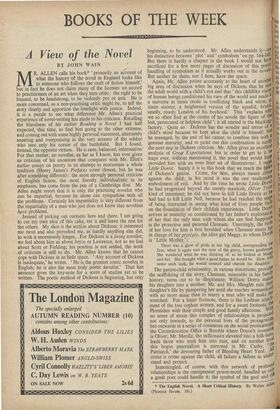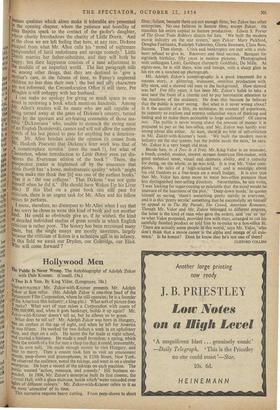A View of the Novel
BY JOHN WAIN R. ALLEN calls his book* ' primarily an account of what the history of the novel in England looks like to someone who follows the craft of fiction himself,' but in fact he does not claim many of the licenses we accord to practitioners of an art when they turn critic: the right to be biassed, to be headstrong, to be violently pro or anti. He is more concerned, as a non-practising critic might be, to tell the story clearly and apportion the limelight with justice. Indeed, it is a puzzle to see what difference Mr. Allen's practical experience of novel-writing has made to his criticism. Recalling the blandness of his earlier Reading a Novel I had half expected, this time, to find him going to the other extreme, and coming out with some highly personal statement, alternately sneering and overpraising in the very accents of the soldier who sees only his corner of the battlefield. But I found, instead, the opposite virtues. He is sane, balanced, informative( For that matter, no novelist, as far as I know, has ever given us criticism of his ancestors that compares with Mr. Eliot's earlier essays on poetry in its attempt to reorientate a whole tradition (Henry James's Prefaces come closest, but he was after something different): the most strongly personal criticism of English fiction, the most fiercely individualistic in its emphases, has come from the pen of a Cambridge don. Mr. Allen might retort that it is only the practising novelist who can be impartial, because he alone can sympathise with all the problems. Certainly his impartiality is very different from the impartiality of a man who just does not know that novelists have problems. Instead of picking out currants here and there, I am going to cut my own slice of this cake, eat it and leave the rest for the others. My slice is the section about Dickens; it interested me most and also provoked me, as hardly anything else did, to wish it enormously longer. For Dickens is a living novelist; we feel about him as about Joyce or Lawrence, not as we feel about Scott or Fielding; his position is not settled, the work of criticism is still to do. Mr. Allen knows that he cannot cope with Dickens in so little space. ` Any account of Dickens is inadequate,' he writes. ' He is the greatest comic novelist in English; he is also the most truly poetic novelist.' That last sentence gives the key-note for a score of studies yet to be written. The poetic method of Dickens is beginning, but only beginning, to be understood. Mr. Allen understands it—see his distinction between plot' and symbolism' on pp. 164.165. But there is hardly a chapter in the book I would not have sacrificed for a few more pages of discussion of this poetic handling of symbolism as it actually works out in the novels. But neither he there, nor I here, have the space. Again, Mr. Allen points accurately to the heart of another big area of discussion when he says of Dickens that he sasr the adult world with a child's eye and that this childlike vision of human beings conditioned his view of the world and ma de it a universe at times crude in conflicting black and white, at times sinister, a heightened version of the squalid, brutal smelly, rowdy London of his boyhood.' This explains NOY we so often find at the centre of his novels the figure of the lost, persecuted or helpless child '; it all started in the blacking' factory. Quite so. Dickens has the wonder and terror of $ child's mind because he kept alive the child in himself; but he managed, by the end of his career, to combine this with $ genuine maturity, and to point out this combination is smell the next step in Dickens criticism. Mr. Allen gives an excellent analysis of Great Expectations, but in order to get to it he leaps over, without mentioning it, the novel that would have provided him with an even finer set of illustrations: I mean Little Dorrit. Surely it is in this book that we reach the hall of Dickens's genius. Crime, for him, always meant crime against the child; in his mind it was the one unalterable embodiment of evil. And by the time he wrote Little Dorrit he had progressed beyond the merely mawkish, Oliver Tirisl kind of treatment; he did not have to kill Little Dorrit as he had had to kill Little Nell, because he had reached the stage of being interested in seeing what kind of lives people built on the foundation of their childish experiences. Little Dorrit arrives at maturity so conditioned by her father's exgloitatiou of her that the only man with whom she can find appincs5 is the protective and paternal Clennam. Unerringly, the WI' of her love for him is first heralded when Clennam meets he' in charge of her protegee, the idiot girl Maggy, to whom Dorrit is Little Mother' : There was a glow of pride in her big child, oversprcadir g i face, when it again met the eyes of the grave, brown gentleman' She wondered what he was thinking of, as he looked at Magill and her. She thought what a good father he would be. How. witti some such look, he would counsel and cherish his daughter. The parent-child relationship, in various distortions, provide' the scaffolding of the story; Clennam, miserable in his family history, turns out to be illegitimate; William Dorrit mall his daughter into a mother; Mr. and Mrs. Meagles ruin their daughter's life by pampering her until she reaches woman hood with no more sense than to marry a man who will make lie' wretched. For a bitter footnote, there is the Lesbian attach' went of the two orphan women, and for a sweet footnote, file Plornishes with their simple and good family affections. With no sense of strain this complex of relationships is projected not only inwards, to the personal lives of the protagonist but outwards in a series of comments on the social predicament' the Circumlocution Office is Bumble where Doyce's inventinS is Oliver; Mr. Merdle, the millionaire elevated into a folk-her°' leads those who trust him into ruin, and on another level this bogus paternalism is mirrored in Mr. Casby, Patriarch,' the devouring father of Bleeding Heart Yard. crime crime is crime against the child, all failure a failure to under stand and protect. Intermingled, of course, with this network of profound relationships is the omnipresent prison-motif, handled as onlY a great poet could handle it; the symbol of the gaol and tbi • The English Novel. A Short Critical History. By Walter (Phoenix House. 18s.) in the opening chapter, where the patience and humility of Jean Baptist spark to the contact of the gaoler's daughter, Whose charity foreshadows the charity of Little Dorrit. And at the close we are left feeling that here, at any rate, Dickens see escaped from what Mr. Allen calls his ` mobd of nightmare compounded of lurid melodrama and savage comedy.' Little borrit marries her father-substitute, and they will both be happy; but their happiness consists of a sane adjustment to the muddle of an imperfect world. The last paragraph tells US, among other things, that they are destined to ' give a mother's care, in the fulness of time, to Fanny's neglected children no less than their own '; the bad and silly characters are not reformed, the Circumlocution Office is still there, Pet Meagies is still unhappy with her husband. I can make no apology for giving so much space to one novel in reviewing a book which mentions hundreds. Among being Allen's readers will be many who are still capable of 'Being turned away at the gates of Dickens's country, turned away by the ignorant and art-fearing comments of those tea- table Dickensians ' who, unable to stomach the strong meat of an English Dostoievski, cannot and will not allow the sombre novels of his last period to pass for anything but a deteriora- tion. Mr. Allen brushes aside the opinion (it comes from Mr. Hesketh Pearson) that Dickens's later work was that of a commonplace novelist' (save the mark I), but what of Chesterton, whose introduction to Little Dorrit even yet dis- figures the Everyman edition of the book ? There, the Prospective reader is frightened off by the assurance that tie Dorrit has ' a loose, melodramatic quality' which ' might That make one think that [it] was one of the earliest books.' rhat it is ' the one collapse.' That Dickens ' was nor quite himself when he did it.' (He should have Woken pp his Liver Bile.) If this libel on a great book can still pass for criticism, there is an urgent task for Mr. Allen and his fellow critics fo perform.
I mean, therefore, no disrespect to Mr.Allen when I say that al nt sorry he chose to write this kind of book and not another kind. He could so obviously give us, if he wished, the kind of detailed individual studies of great novels in which English criticism is rather poor. The history has been recounted many !limes, but the single essays are mostly unwritten, largely because the criticism of fiction is a technique still in its infancy. In this -field we await our Dryden, our Coleridge, our Eliot. Who will come forward ?



































 Previous page
Previous page